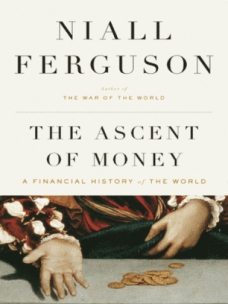As the infamous line from Cabaret says, “Money makes the world go round.” Understanding the nature of this pivotal tool is important for grasping its ubiquitous presence in our lives. The failure to do so automatically renders us servile to the dictates of those who deliberately manipulate the money supply.

As the author succinctly puts it, “Money is trust inscribed.” If that is true, then how can trust be put into a currency that is fractionally reserved? While the Italian Medici family of the Renaissance era transitioned banking from a reviled business practice into a respectable (and therefore highly profitable) industry, it was the Swedish Riksbank in 1656 that actually combined the storage capability of precious metals with the lending function that is now known as fractional reserve lending. Despite this blatant form of mass counterfeiting, Ferguson still maintains that banking in the overall aggregate is still preferable to loan sharking.
Once it became acceptable banking practice to charge interest on loans, then it wasn’t too much of a stretch for governments to borrow wealth from a variety of lenders. Trading government debts for profit is the essence of the bond market, crazy as that may sound. What’s even worse than that is that the behavior of the bond market not only determines the monetary value of pensions, but it also sets the de facto long-term interest rates (the immediate interest rates are set by a central bank whenever they sell government bonds; this causes bond prices to decline which in turn increases the interest rate, and obviously vice versa).
Stock markets, originally devised as a way of trading capital investments in businesses, has now degenerated into a casino racket fueled by speculative bubbles. John Law’s monopolistic control of the French economy during the reign of King Louis XV gave rise to the Mississippi Company bubble, which was irresistible to this Scottish gambler. Ken Lay might as well have been Law’s apprentice, since he too profited from the infamous Enron scandal by fraudulently cooking the accounting ledgers.
Ironically, insurance is most used wherever the risk is lowest, not where it would be most needed, since that threatens the bottom line of insurance companies. The insidious notion of the welfare State is promulgated as a way to spread risk in its totality amongst its eligible citizens, from cradle to grave (but that’s okay just as long as it works as well as it does in Japan). Hedge funds seem little more than a bigger stakes version of the stock market itself.
The distinction between the “property-owning aristocracy” and the “home-owning democracy” attempts to highlight the supposed historical improvement of the seething biomass, but it does not account for the role of governments in tricking the hapless citizenry into believing they “own” real property under this God awful fee simple system (which is where the State’s power of eminent domain comes from) instead of by allodial title. Worse than “owning” a home under fee simple (where you also have to pay a rent to the government, called a “property tax”), is mortgaging the property under the terms of a loan contract with a bank that makes it literally impossible for all borrowers to pay back the principle plus interest in the first place! This is further worsened by the process of “securitization,” whereby mortgages are converted into bonds and traded for profit. It’s little more than a sickening institutionalized practice of stealing wealth by trading other people’s debts.
Globalization is often touted by well-meaning but inept libertarians as somehow increasing economic development (and thus Liberty) by lowering barriers to international trade. What they fail to realize is that such “free trade” is little more than a cover for cartel agreements who benefit from government privilege to the exclusion of other serious competitors. This can be observed with the trading arrangements between the “capitalist” United States and the “communist” Chinese, both of whom in actuality are nothing more than corporatists (which is why they get along so well). When the fictional “financial” wealth of the world exceeds that of the earth’s real wealth (as expressed in terms of human labour and natural resources), Ferguson’s “Planet Finance,” as the definitive product of corporate globalization, is long overdue for being toppled over like the fraud that it is.
Niall Ferguson’s The Ascent of Money: A Financial History of the World is an intriguing look at how “Western” civilization’s powers of monetary acumen developed over the centuries. I didn’t appreciate how he expounded John Keynes as being oh-so-correct about “macroeconomics,” yet the only real opposition to that he presented was the Chicago School; the Austrian School was completely neglected to the detriment of this book, as Murray Rothbard’s explanation of the business cycle would have satisfied Ferguson’s concerns about “fat tails.” While in the final analysis Ferguson was fundamentally defending the Establishment, I think he inadvertently demonstrated just how longstanding the fraud of the high finance special interests really are and not some recent invention. If you prefer not to read the book, there is also a miniseries documentary version of the book available featuring the author.




















